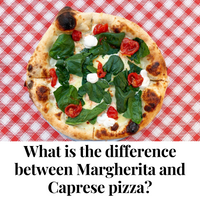Making your own pizza at home may seem healthier than buying one, but is it really? Homemade pizza is very popular at present times as many people tried and tested them during the pandemic. So here we weigh the benefits and drawbacks of homemade pizza to see whether it is actually as healthy as you would believe.
When compared to takeaway or delivery, homemade pizza may seem a healthier alternative, but it all depends on the ingredients you use. You'll receive a healthier slice of pizza if you create your own dough and top it with fresh vegetables as opposed to ordering pizza delivery from a restaurant. There is no getting past the reality that pizza is a high-calorie food, even if you use healthy components. Before you add any toppings, a slice of handmade cheese pizza has roughly 300 calories. It's crucial to control your portion proportions if you want to keep your pizza healthy. In addition to this pizza has a lot of salt as well. Around 600 milligrams of salt, or about one-fourth of the daily recommended amount for adults, can be found in one slice of cheese pizza.
Try these suggestions to make your homemade pizza healthier:
- preparing your own dough: Dough from the store is frequently laden with salt and other preservatives. It is simple and only takes a few minutes to make your own dough.
- Add in a lot of vegetables: Fresh vegetables offer vitamins, minerals, and fiber to your pizza while having fewer calories than meat toppings. Consider topping your pizza with vegetables like tomatoes, spinach, onions, mushrooms, or peppers which all are low-caloric in nature.
- Watch your portion sizes: It's simple to consume too much pizza, particularly if you consume it immediately after it comes out of the oven. Save half of your slice for later and cut it in half. Or even better, split the pizza with a friend or member of your family.
There are numerous discussions over what constitutes healthy pizza. The claim that pizza is harmful because it contains so many calories and fats is one that is frequently made. However, making pizzas homemade could help with this angle.
- You are in charge of the ingredients' quality.
Making your own pizza is a wonderful option if you're worried about the quality of the components in it or if you're trying to avoid particular substances (such as preservatives or bad fats). You may feel good about the pizza you're eating since you have complete control over the ingredients' quality and freshness when you create it at home.
- You are well aware of the ingredients in your pizza.
Making your own pizza has a number of advantages, one of which is knowing exactly what ingredients are used. You have no means of knowing whether a restaurant or pizzeria is utilizing fresh, high-quality ingredients when you order a pizza from them. Making your own pizza at home allows you to select the greatest and freshest ingredients, producing a pizza that is both healthier and tastier.
Contrary to what some people may claim, pizza cannot be considered nutritious or healthy even if made at home. It could be healthier than the pizzeria but still not the best food if on a diet restriction. Even if you create your own whole wheat dough and use only natural toppings, pizza will still be a high-calorie, high-carb supper.
One slice of homemade pizza (1/8 of a 14-inch pie) has about:
Calories: 283
Fat: 10 g
Saturated fat: 3.5 g
Carbohydrates: 36 g
Fiber: 2 g
Protein: 10 g
Sodium: 562 mg
Sugars: 4 g
Pizza is not a healthy food to eat if you're trying to eat well. There are healthier and better methods to satisfy your craving for Italian food.
Making Pizza at Home Isn't Always Less Expensive
According to one study, the cost to make a homemade pizza is $4.50 per pie, compared to the $5.93 cost of a store-bought pizza. According to the study, cooking a pizza at home costs more in time even though the ingredients are less expensive than ordering one. In other words, it's better to buy a pizza than to bake one at home if you're short on time and money. The survey also discovered that, while the quality of homemade pizzas hasn't changed in recent years, it has improved for store-bought pizzas. For pizza shipped from Italy, you might get some vegan and low-calorie options.
Conclusion
Pizza cooked from scratch can generally be a healthy choice. Really, it just comes down to the ingredients you choose. A pizza made with whole wheat crust, lean meats, and lots of vegetables will be nutrient-dense and relatively low in calories. However, you'll have a less healthy lunch if you stuff your pie with processed meats and full-fat cheeses. Therefore, the next time you're craving pizza, consider preparing it at home using low-calorie toppings. Then you can ditch the guilt and have them without a care about the World. Our real Italian pizzas from Italy are handmade with all-natural of high quality and fresh ingredients in Naples, Italy delivered to you, anywhere in the U.S. Free Shipping Nationwide. Order here now!








0 comments